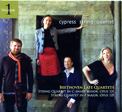BEETHOVEN Late Quartets, Vol. 1 – String Quartet No. 14 in C-sharp Minor, Op. 131; String Quartet No. 16 in F Major, Op. 135 – Cypress String Quartet – Hewlett Foundation
Audiophile Audition
The Cypress' approach suggests a "revisionist" Beethoven from a modern perspective that still shares much with the groundbreaking path instituted by the Busch Quartet three generations ago.
Published on August 10, 2009

I can state, unequivocally, that I owe the Cypress Quartet (estab. 1996) a debt from this recording of Beethoven's Op. 131, their having reminded me of its radical and mercurial character, how extraordinarily audacious and wild it must have appeared to Beethoven's contemporaries. From the opening fugue--that eternal inspirator of all of Bartok--the Cypress' approach: spare vibrato; thin, lean attacks from their Bergonzi, Stradivari, and Amati instruments, especially from the tonic; their plastic yet sudden shifts in rhythm and dynamics; the intensity of their pizzicati and rasping arco riffs; all suggest a "revisionist" Beethoven from a modern perspective that still shares much with the groundbreaking path instituted by the Busch Quartet three generations ago. Is not "sudden" one of the many indictments against Macbeth's reign? The fact that each of the seven movements segues into the next only exaggerates the strict-yet-free character of the composer‘s craft, the often unnerving balance of musical stricture and rhapsodic imagination. The poignant delicacy of the B Minor Allegro moderato, moves with a sense of awed fixation into the grand Andante in A Major, certainly among the most simultaneously cerebral and spiritual creations in art. The last movements strike me with vitriolic accuracy, almost numbing figures in esoteric potent geometry. Didn't Schubert lament upon hearing this piece, "After such music, what is left for the rest of us to write?"
The F Major Quartet becomes doubly ingenuous after the emotional and stringent aesthetics of the C-sharp Minor, its "naïve," laconic classicism either a refreshment or an ironic rebuke. Mark Willisher's close miking of the instruments places us at the center of the philosophical controversy, "Must it be?" Ethan Filner's viola strikes us in the first movement, beckoning to responses from Cecily Ward, violin and cello Jennifer Kloetzel. We can hear the plangent, rocking sequences that will provide much of the Lento assai's main theme. The inevitable Beethoven obsessions come forth in the Vivace, whose obstinate and furious whirling eddies convey a raucous, almost uncouth power. The great attentions, cantate e tranquillo, to the slow movement urge its unearthly anguish upon our reluctant acquiescence: "It must be." The Cypress appears to revel in the singular disposition of Beethoven’s harmonies, the psychic mid-wifery, as each progression yields to the inevitable revelation of melody that ushers forth from the violin part over a throbbing or groaning bass. Finally, the hard-won but buoyant resolution, Beethoven's last thoughts in the medium which had always acknowledged his mastery of musical, psychological, and spiritual crises, distinctions without a difference.
--Gary Lemco